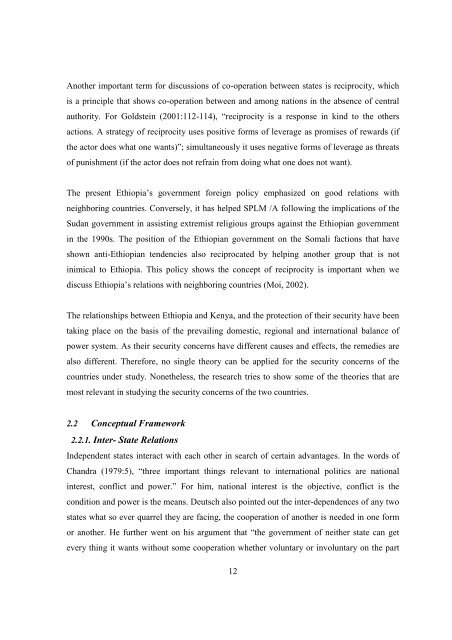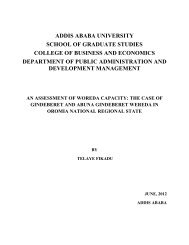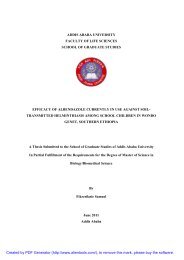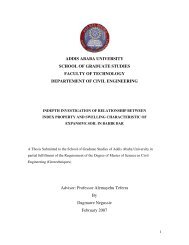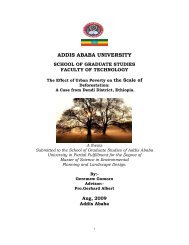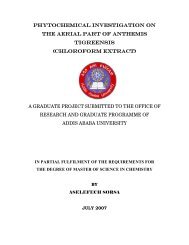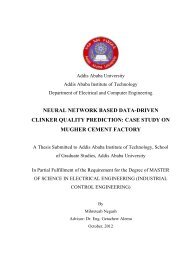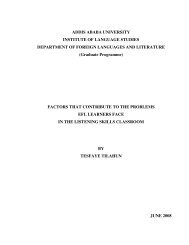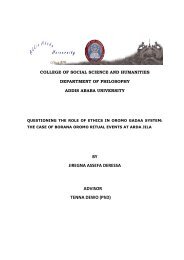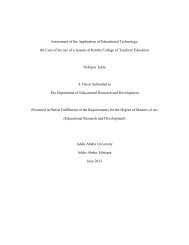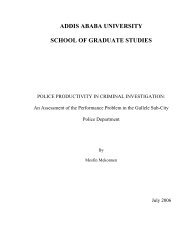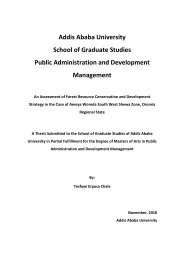HENOK MERHATSIDK 1.pdf - Addis Ababa University
HENOK MERHATSIDK 1.pdf - Addis Ababa University
HENOK MERHATSIDK 1.pdf - Addis Ababa University
You also want an ePaper? Increase the reach of your titles
YUMPU automatically turns print PDFs into web optimized ePapers that Google loves.
Another important term for discussions of co-operation between states is reciprocity, which<br />
is a principle that shows co-operation between and among nations in the absence of central<br />
authority. For Goldstein (2001:112-114), “reciprocity is a response in kind to the others<br />
actions. A strategy of reciprocity uses positive forms of leverage as promises of rewards (if<br />
the actor does what one wants)”; simultaneously it uses negative forms of leverage as threats<br />
of punishment (if the actor does not refrain from doing what one does not want).<br />
The present Ethiopia’s government foreign policy emphasized on good relations with<br />
neighboring countries. Conversely, it has helped SPLM /A following the implications of the<br />
Sudan government in assisting extremist religious groups against the Ethiopian government<br />
in the 1990s. The position of the Ethiopian government on the Somali factions that have<br />
shown anti-Ethiopian tendencies also reciprocated by helping another group that is not<br />
inimical to Ethiopia. This policy shows the concept of reciprocity is important when we<br />
discuss Ethiopia’s relations with neighboring countries (Moi, 2002).<br />
The relationships between Ethiopia and Kenya, and the protection of their security have been<br />
taking place on the basis of the prevailing domestic, regional and international balance of<br />
power system. As their security concerns have different causes and effects, the remedies are<br />
also different. Therefore, no single theory can be applied for the security concerns of the<br />
countries under study. Nonetheless, the research tries to show some of the theories that are<br />
most relevant in studying the security concerns of the two countries.<br />
2.2 Conceptual Framework<br />
2.2.1. Inter- State Relations<br />
Independent states interact with each other in search of certain advantages. In the words of<br />
Chandra (1979:5), “three important things relevant to international politics are national<br />
interest, conflict and power.” For him, national interest is the objective, conflict is the<br />
condition and power is the means. Deutsch also pointed out the inter-dependences of any two<br />
states what so ever quarrel they are facing, the cooperation of another is needed in one form<br />
or another. He further went on his argument that “the government of neither state can get<br />
every thing it wants without some cooperation whether voluntary or involuntary on the part<br />
12


